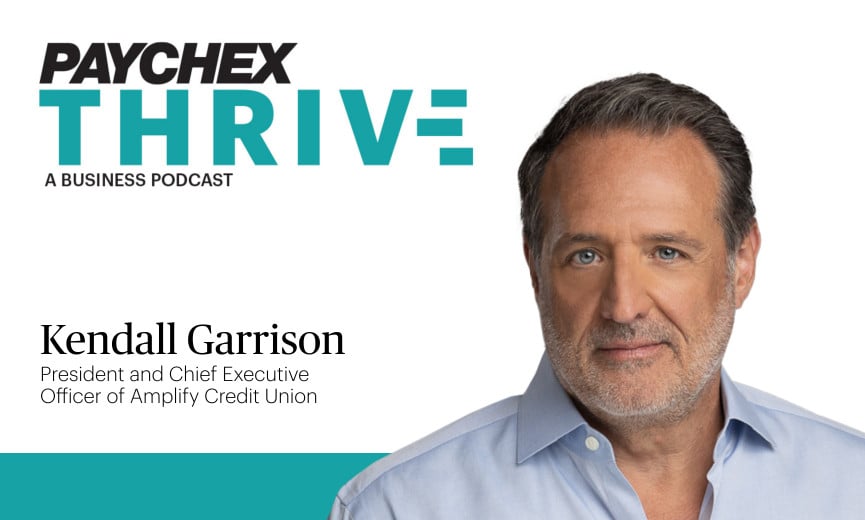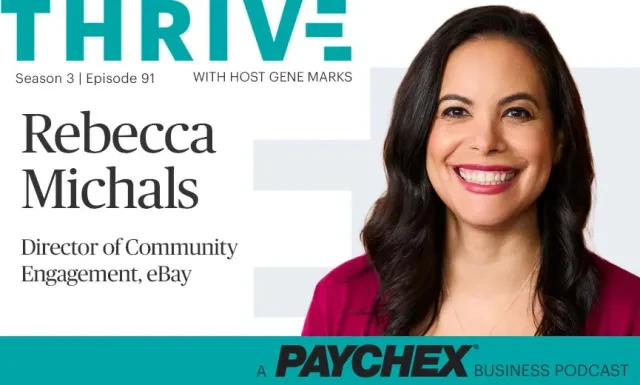Informes 1099-K, financiación para prestatarios desfavorecidos y mayor productividad gracias a la modalidad híbrida

Podcast •

Resumen
A study reveals that a greater percentage of workplaces with hybrid policies are far more productive than a 100 percent return-to-office workplace. Host Gene Marks advocates for hybrid policies and flexibility for employees and employers. In this week’s episode, he shares details about the states that are next up for funding through the State Small Business Credit Initiative and says that the money is there for disadvantaged and minority-owned businesses. Plus, the IRS delays changing the Form 1099-K threshold in 2023, which means using third-party platforms for payments won’t result in more forms for most businesses. Listen to the podcast for more details.
Ver transcripción
[Gene Marks, host]
Hey everybody, it’s Gene Marks and welcome to another episode of the Paychex THRIVE Week in Review podcast. This is where every week we take a few items in the news that impact your small business and give you a few thoughts on how it impacts you and maybe some advice, as well. So, let's get to it with you.
The first bit of news that comes this week is from the IRS. It's actually last week. They announced a delay – the agency did – in the form 1099 reporting threshold for third-party payment platforms. So, the following feedback from taxpayers, this according to the IRS statement, tax professionals and payment processors, and to reduce taxpayer confusion, the IRS released a new notice announcing a delay of the new $600 form 1099-K reporting threshold for third-party settlement organizations.
As the IRS continues to work to implement the new law, the agency will treat 2023 as an additional transition year. This will reduce the potential confusion caused by the distribution of an estimated 44 million Forms 1099-K sent to many taxpayers who wouldn't expect one and may not have a tax obligation. As a result, reporting will not be required unless the taxpayer receives over $20,000 and has more than 200 transactions in 2023. However, that's going to go down that threshold to $5,000 for the tax year 2024.
So, what does this all mean? Not a lot, really. What this rule was intended to be is for third-party payment platforms like PayPal and, you know, Zelle and Venmo, that if you, during the course of the year receive payments from them in excess of $600, even if it was from various sources and even if it was from your friends and relatives rather than a business transaction, those payment platforms will still need to report those those transactions over $600 to the IRS and to, you as well,
This is going to create a lot of extra paperwork. And let's face it, if you're running a business and you're getting those transactions as revenue, you should be reporting it anyway. It was really designed by the IRS to try and catch taxpayers that aren't reporting those transactions. Anyway, it was going to cause a lot of confusion.
Bottom line is, nothing's changed. Everything is still the same. You know, if you are paying any independent contractors more than $600 in a year, you should be giving them a 1099. If you are getting paid more than $600 for business purposes for any customers, and they ask for an iPhone or a Social Security number, they want to give you a 1099. That's fine, as well. Hopefully you're reporting it anyway.
But the bottom line is this; this whole new reporting requirement of these third-party payment processors, it's a big mess. It's going to be delayed in 2024 and I'm betting it's going to be delayed indefinitely, but that's just my opinion.
So, nothing for you to worry about now if you were worried about those 1099 forms that you were potentially going to be receiving.
The next bit of news which comes from the Treasury Department. The Biden administration has announced that they are going to be distributing money to 20 additional states under the State Small Business Credit Initiative. This distribution is going to total about $51 million and go out to support small businesses in those 20 states. These states include Michigan, Virginia, South Carolina, and obviously a bunch more.
Guys, this is not news. This was announced by the Biden administration this past week as news that this money was being distributed, which is great, but the State Small Business Credit Initiative was actually legislated by Congress a few years ago during COVID under the Trump administration, actually. It is just now getting underway to implement this distribution of funds, which has been done over this past year. Actually, it started a year and a half ago.
The bottom line, though, is this a lot of money, billions of dollars are being distributed to states under the State Small Business Credit Initiative. The states are then giving this money to nonprofit organizations that support small businesses. These nonprofits are all in your area; They could be minority depository institutions. They could be nonprofit groups that provide counseling and funding. It could be private equity investors, as well, all receiving money from the state with the mandate to turn around and give it out to small businesses.
So, if you're looking for potential funding and whether you're a minority business or not, you should be Googling State Small Business Credit Initiative and the name of your state. That will likely take you to your state's website, where it will tell you where the money is being distributed to. You then want to go after those nonprofit organizations and say to them, “Hey, I'd like some of that money to, how do I apply?” and they will give you more instructions.
So, the State Small Business Credit Initiative, $10 billion going out to states across the country. It started about a year or a year and a half ago, but it's still very much happening now, and that's money that you should be taking advantage of if you feel the need.
Finally, new data could shift the conversation around productivity metrics of returning to offices among the leaders that are still resisting more flexible policies. This comes from workplace.news, which is a, you know, a worker workplace, you know, news site.
From ‘20 to ’22, companies without in-office requirements saw revenue grow 20%, while those in hybrid and fully in-person arrangements saw just a 5% revenue growth. This is according to a new report from Scoop Technologies and the Boston Consulting Group. The report analyzed 554 publicly traded companies across 20 different sectors and adjusted for industry averages. All together, these companies employ about 27 million people.
So, listen up. Those with structured hybrid policies most often two or three days required in-person a week performed better on revenue growth than those requiring their employees to come full time in the office.
Some company leaders have justified their return-to-office mandates with goals of strengthening collaboration, innovation, and company culture in ways they feel they couldn't while working remotely, hoping the improvements will translate to positive business outcomes. Some believe that the report's results re-emphasize that there is no single magic productivity measure, and that more investigation is needed before many dismiss the notion of remote working in favor of office.
My take on this, everyone is you should have a hybrid policy. That's what most of my clients are doing, both big and small. Whether it's one day you can allow your employees to work from home or a couple of days, it's fair enough to have them come in the office for two, three, even four days a week. But you should be giving your employees the options to work from home if they're able to do that. It is a very, very important benefit to provide and employees are looking for flexibility in their work life.
The technology is there, it's proven it's worked. You need to be doing that. You need to be having a hybrid work policy. Again, that is just my opinion.
You've been listening to the project's Week in Review podcast, the THRIVE Podcast. My name is Gene Marks. If you have any advice or news or if you'd like to suggest a guest for our regular THRIVE podcast, please visit us at payx.me/thrivetopics.
Thank you so much for listening. We'll be back again next week with some news that impacts your business and how it impacts your business. Take care.
Este pódcast es propiedad de Paychex, Inc. 2023. Todos los derechos reservados.

 Apple Podcast
Apple Podcast Spotify
Spotify iHeartRadio
iHeartRadio







